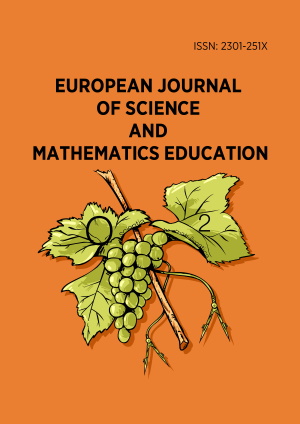Research Article
Mediating role of metacognitive awareness between attitude and mathematics reasoning in pre-service teachers
More Detail
1 Department of Mathematics and Science Education, Faculty of Education, Universiti Malaya, Kuala Lumpur, MALAYSIA* Corresponding Author
European Journal of Science and Mathematics Education, 13(2), April 2025, 90-102, https://doi.org/10.30935/scimath/16116
Published Online: 11 March 2025, Published: 01 April 2025
OPEN ACCESS 3484 Views 1060 Downloads
ABSTRACT
This study aimed to determine the relationship between attitude, metacognitive awareness, and mathematics reasoning, as well as investigate the role of metacognitive awareness as a mediator. This study examined data from 378 pre-service teachers in Malaysia. The data were gathered by administering questionnaires and a mathematics reasoning assessment. The data were examined using the structural equation modelling technique. The results demonstrated substantial correlation through all variables, and path analysis revealed that metacognitive awareness mediates the relationship between attitude and mathematics reasoning. The results indicate that attitude has an essential impact on influencing the reasoning capabilities of pre-service teachers in mathematics by fostering the growth of metacognitive awareness.
CITATION (APA)
Tak, C. C., Zulnaidi, H., & Eu, L. K. (2025). Mediating role of metacognitive awareness between attitude and mathematics reasoning in pre-service teachers. European Journal of Science and Mathematics Education, 13(2), 90-102. https://doi.org/10.30935/scimath/16116
REFERENCES
- Abdelrahman, R. M. (2020). Metacognitive awareness and academic motivation and their impact on academic achievement of Ajman University students. Heliyon, 6(9), Article e04192. https://doi.org/10.1016/j.heliyon.2020.e04192
- Adinda, A., Purwanto, Parta, I. N., & Chandra, T. D. (2021). Investigation of students’ metacognitive awareness failures about solving absolute value problems in mathematics education. Eurasian Journal of Educational Research, 2021(95), 17–35. https://doi.org/10.14689/EJER.2021.95.2
- Agustyaningrum, N., Hanggara, Y., Husna, A., Maman Abadi, A., & Mahmudii, A. (2019). An analysis of students’ mathematical reasoning ability on abstract algebra course. International Journal of Scientific & Technology Research, 8(12), 2800–2805.
- Ajisuksmo, C. R. P., & Saputri, G. R. (2017). The influence of attitudes towards mathematics, and metacognitive awareness on mathematics achievements. Creative Education, 8(3), 486–497. https://doi.org/10.4236/ce.2017.83037
- Albay, E. M. (2019). Analyzing the effects of the problem solving approach to the performance and attitude of first year university students. Social Sciences and Humanities Open, 1(1), Article 100006. https://doi.org/10.1016/j.ssaho.2019.100006
- Alibraheim, E. A. (2021). Factors affecting freshman engineering students’ attitudes toward mathematics. Eurasia Journal of Mathematics, Science and Technology Education, 17(6), Article em1973. https://doi.org/10.29333/ejmste/10899
- Awang, Z. (2018). A handbook on structural equation modeling using AMOS. Universiti Teknologi MARA Publication.
- Aydin, N., & Halat, E. (2009). The impact of undergraduate mathematics courses on college students’ geometric reasoning stages. The Mathematics Enthusiast, 6(1-2), 151–164. https://doi.org/10.54870/1551-3440.1142
- Basir, M. A., Waluya, S. B., Dwijanto, & Isnarto. (2022). How students use cognitive structures to process information in the algebraic reasoning? European Journal of Educational Research, 11(2), 821–834. https://doi.org/10.12973/eu-jer.11.2.821
- Bergqvist, E. (2007). Types of reasoning required in university exams in mathematics. Journal of Mathematical Behavior, 26(4), 348–370. https://doi.org/10.1016/j.jmathb.2007.11.001
- Braithwaite, D. W., Leib, E. R., Siegler, R. S., & McMullen, J. (2019). Individual differences in fraction arithmetic learning. Cognitive Psychology, 112, 81–98. https://doi.org/10.1016/j.cogpsych.2019.04.002
- Bulut, İ. (2018). The levels of classroom and pre-school teachers’ metacognitive awareness. Universal Journal of Educational Research, 6(12), 2697–2706. https://doi.org/10.13189/UJER.2018.061201
- Camacho, A. G. (2022). The mediating effect of academic motivation on the relationship between metacognitive skills, students attitudes and beliefs toward mathematics. International Journal of Research and Innovation in Social Science, 6(7), 296–308. https://doi.org/10.47772/ijriss.2022.6721
- Chan, C. T., Hutkemri, Z., & Leong, K. E. (2021). Analysis validity and reliability of self-efficacy and metacognitive awareness instrument toward mathematical reasoning. Turkish Journal of Computer and Mathematics Education, 12(9), 3332–3344. https://doi.org/10.17762/turcomat.v12i9.5739
- Chua, Y. P. (2020). Mastering research statistics. McGraw-Hill.
- Ekici, F., Ulutas, B., & Atasoy, B. (2019). An investigation of pre-service teachers’ levels of metacognitive awareness in terms of certain variables. Journal of Faculty of Education, 8(3), 1035–1054. https://doi.org/10.14686/buefad.566640
- Ensley, D. E., & Crawley, J. W. (2006). Discrete mathematics: Mathematical reasoning and proof with puzzles, patterns, and games. Wiley.
- Fennema, E., & Sherman, J. A. (1976). Fennema-Sherman mathematics attitudes scales: Instruments designed to measure attitudes toward the learning of mathematics by females and males. Journal for Research in Mathematics Education, 7(5), 324–326. https://doi.org/10.5951/jresematheduc.7.5.0324
- Harding, A., Engelbrecht, J., & Verwey, A. (2011). Implementing supplemental instruction for a large group in mathematics. International Journal of Mathematical Education in Science and Technology, 42(7), 847–856. https://doi.org/10.1080/0020739X.2011.608862
- Hassan, N. M., & Rahman, S. (2017). Problem solving skills, metacognitive awareness, and mathematics achievement: A mediation model. New Educational Review, 49(3), 201–212. https://doi.org/10.15804/tner.2017.49.3.16
- Herizal, H., Marhami, M., Fonna, M., & Rohantizani, R. (2022). Preservice mathematics teachers’ reasoning in solving critical thinking problem. BAREKENG: Jurnal Ilmu Matematika Dan Terapan, 16(1), 1–6. https://doi.org/10.30598/barekengvol16iss1pp001-006
- Izadi, S., Hadipour, M., & Ahmadabadi, N. M. (2018). Explaining the attitude towards mathematics in students on the basis of goal adjustment strategies and metacognitive beliefs. Creative Education, 9(7), 1042–1053. https://doi.org/10.4236/ce.2018.97077
- Jeffrey, O. B., & William, L. B. (2018). Using & understanding mathematics: A quantitative reasoning approach. Pearson.
- Jensen, J. L., Neeley, S., Hatch, J. B., & Piorczynski, T. (2017). Learning scientific reasoning skills may be key to retention in science, technology, engineering, and mathematics. Journal of College Student Retention: Research, Theory and Practice, 19(2), 126–144. https://doi.org/10.1177/1521025115611616
- Kartika, H. (2019). Analysis of undergraduate students’ metacognitive awareness based on class level. PUPIL: International Journal of Teaching, Education and Learning, 5(1), 164–172. https://doi.org/10.20319/pijtel.2019.31.164172
- Kashefi, H., Zaleha, I., Fariba, M., Tak, C. C., Sharifah Nasriah, W. O., & Ching, T. Y. (2017). Teaching and learning theories applied in mathematics classroom among primary school teachers. In Proceedings of the 7th World Engineering Education Forum (pp. 607–612). https://doi.org/10.1109/WEEF.2017.8467070
- Larkin, K., & Jorgensen, R. (2015). ‘I hate maths: Why do we need to do maths?’ Using iPad video diaries to investigate attitudes and emotions towards mathematics in year 3 and year 6 students. International Journal of Science and Mathematics Education, 14(5), 925–944. https://doi.org/10.1007/s10763-015-9621-x
- León-Mantero, C., Casas-Rosal, J. C., Pedrosa-Jesús, C., & Maz-Machado, A. (2020). Measuring attitude towards mathematics using Likert scale surveys: The weighted average. PLoS ONE, 15(10), Article e0239626. https://doi.org/10.1371/journal.pone.0239626
- Lingel, K., Lenhart, J., & Schneider, W. (2019). Metacognition in mathematics: Do different metacognitive monitoring measures make a difference? ZDM–Mathematics Education, 51(4), 587–600. https://doi.org/10.1007/s11858-019-01062-8
- Manmai, T. O., Inprasitha, M., & Changsri, N. (2021). Cognitive aspects of students’ mathematical reasoning habits: A study on utilizing lesson study and open approach. Pertanika Journal of Social Sciences and Humanities, 29(4), 2591–2614. https://doi.org/10.47836/PJSSH.29.4.27
- Masfingatin, T., Murtafiah, W., & Maharani, S. (2020). Exploration of creative mathematical reasoning in solving geometric problems. Jurnal Pendidikan Matematika, 14(2), 155–168. https://doi.org/10.22342/jpm.14.2.7654.155-168
- Mata-Pereira, J., & da Ponte, J. P. (2017). Enhancing students’ mathematical reasoning in the classroom: teacher actions facilitating generalization and justification. Educational Studies in Mathematics, 96(2), 169–186. https://doi.org/10.1007/S10649-017-9773-4
- Mazana, M. Y., Montero, C. S., & Casmir, R. O. (2018). Investigating students’ attitude towards learning mathematics. International Electronic Journal of Mathematics Education, 14(1), 207–231. https://doi.org/10.29333/iejme/3997
- Mitsea, E., & Drigas, A. (2019). A journey into the metacognitive learning strategies. International Journal of Online and Biomedical Engineering, 15(14), 4–20. https://doi.org/10.3991/IJOE.V15I14.11379
- Morali, H. S., & Filiz, A. (2023). Incorrect theorems and proofs: An analysis of pre-service mathematics teachers’ proof evaluation skills. Journal of Pedagogical Research, 7(3), 248–262. https://doi.org/10.33902/JPR.202318840
- Morris, A. K. (2010). Mathematical reasoning: Adults’ ability to make the inductive-deductive distinction. Cognition and Instruction, 20(1), 79–118. https://doi.org/10.1207/S1532690XCI2001_4
- Morsanyi, K., Cheallaigh, N. N., & Ackerman, R. (2019). Mathematics anxiety and metacognitive processes: Proposal for a new line of inquiry. Psychological Topics, 28(1), 147–169. https://doi.org/10.31820/pt.28.1.8
- Morsanyi, K., McCormack, T., & O’Mahony, E. (2018). The link between deductive reasoning and mathematics. Thinking and Reasoning, 24(2), 234–257. https://doi.org/10.1080/13546783.2017.1384760
- Murtafiah, W., Sa’dijah, C., Candra, T. D., Susiswo, & As’ari, A. R. (2018). Exploring the explanation of pre-service teacher in mathematics teaching practice. Journal on Mathematics Education, 9(2), 259–270. https://doi.org/10.22342/JME.9.2.5388.259-270
- Radmehr, F., & Drake, M. (2020). Exploring students’ metacognitive knowledge: The case of integral calculus. Education Sciences, 10(3), Article 55. https://doi.org/10.3390/educsci10030055
- Rahman, S., Yasin, R. M., Salamuddin, N., & Surat, S. (2014). The use of metacognitive strategies to develop research skills among postgraduate students. Canadian Center of Science and Education, 10(19), 271–275. https://doi.org/10.5539/ass.v10n19p271
- Robillos, R. J., & Bustos, I. G. (2022). Learners’ listening skill and metacognitive awareness through metacognitive strategy instruction with pedagogical cycle. International Journal of Instruction, 15(3), 393–412. https://doi.org/10.29333/iji.2022.15322a
- Roick, J., & Ringeisen, T. (2017). Self-efficacy, test anxiety, and academic success: A longitudinal validation. International Journal of Educational Research, 83, 84–93. https://doi.org/10.1016/j.ijer.2016.12.006
- Roick, J., & Ringeisen, T. (2018). Students’ math performance in higher education: Examining the role of self-regulated learning and self-efficacy. Learning and Individual Differences, 65, 148–158. https://doi.org/10.1016/j.lindif.2018.05.018
- Salam, M., Misu, L., Rahim, U., Hindaryatiningsih, N., & Ghani, A. R. A. (2020). Strategies of metacognition based on behavioural learning to improve metacognition awareness and mathematics ability of students. International Journal of Instruction, 13(2), 61–72. https://doi.org/10.29333/iji.2020.1325a
- Schraw, G., & Dennison, R. S. (1994). Metacognitive awareness inventory (MAI). APA PsycTests. https://doi.org/10.1037/t21885-000
- Segarra, J., & Julia, C. (2022). Mathematics teaching efficacy belief and attitude of pre-service teachers and academic achievement. European Journal of Science and Mathematics Education, 10(1), 1–14. https://doi.org/10.30935/SCIMATH/11381
- Singh, P., Hoon, T. S., Akmal, N., Nasir, M., Hoon, S., Han, T., Rasid, M., & Bzh, J. (2020). An analysis of students’ mathematical reasoning and mental computation proficiencies. Universal Journal of Educational Research, 8(11), 5628–5636. https://doi.org/10.13189/ujer.2020.081167
- Sopekan, O. S., & Awofala, A. O. A. (2019). Mathematics anxiety and mathematics beliefs as correlates of early childhood pre-service teachers’ numeracy skills. PedActa, 9(2), 13–24. https://doi.org/10.24193/pedacta.9.2.2
- Suryadi, B., & Santoso, T. I. (2017). Self-efficacy, adversity quotient, and students’ achievement in mathematics. International Education Studies, 10(10), Article 12. https://doi.org/10.5539/ies.v10n10p12
- Tak, C. C., Hutkemri, Z., & Leong, K. E. (2022). Measurement model testing: Adaption of metacognitive awareness toward mathematic reasoning among undergraduate education students. Contemporary Mathematics and Science Education, 3(2), Article ep22021. https://doi.org/10.30935/conmaths/12510
- Tak, C. C., Zulnaidi, H., & Eu, L. K. (2023). Mediating role of metacognitive awareness between self-efficacy and mathematics reasoning among education undergraduate students during pandemic. Journal of Higher Education Theory and Practice, 23(6), 36–46. https://doi.org/10.33423/jhetp.v23i6.5959
- Tapia, M., & Marsh, G. E. (2004). An instrument to measure mathematics attitudes. Academic Exchange Quarterly, 8(2), 16–22.
- Wonu, N., & Paul-Worika, O. (2019). Enhancing metacognitive knowledge of cognition among junior secondary students with mathematics disability in everyday arithmetic. American Journal of Educational Research, 7(2), 153–160. https://doi.org/10.12691/education-7-2-6
- Woolley, J. S., Deal, A. M., Green, J., Hathenbruck, F., Kurtz, S. A., Park, T. K. H., Pollock, S. V. S., Transtrum, M. B., & Jensen, J. L. (2018). Undergraduate students demonstrate common false scientific reasoning strategies. Thinking Skills and Creativity, 27, 101–113. https://doi.org/10.1016/j.tsc.2017.12.004
- Zeleke, G. A., & Semela, T. (2017). Mathematics attitude among university students: Implications for science and engineering education. The Ethiopian Journal of Education, 35(2), 1–29.
- Zsoldos-Marchis, I. (2015). Changing pre-service primary-school teachers’ attitude towards mathematics by collaborative problem solving. Procedia-Social and Behavioral Sciences, 186, 174–182. https://doi.org/10.1016/J.SBSPRO.2015.04.100
- Zulkipli, Z. A., Mohd Yusof, M. M., Ibrahim, N., & Dalim, S. F. (2020). Identifying scientific reasoning skills of science education students. Asian Journal of University Education, 16(3), 275–280. https://doi.org/10.24191/ajue.v16i3.10311


 The articles published in this journal are licensed under the CC-BY Creative Commons Attribution International License.
The articles published in this journal are licensed under the CC-BY Creative Commons Attribution International License.